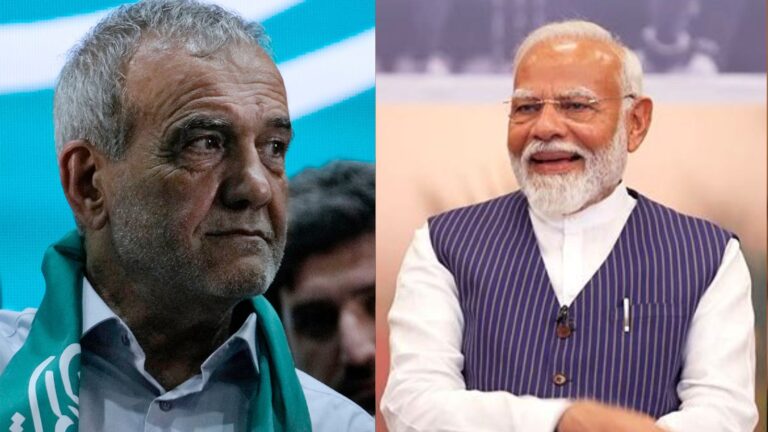Several Iranian nationals, including Ambassador Iraj Elahi, embassy staff and their families, Iranian students, businessmen and professionals living and working in NCR, gathered at the Iranian Cultural House on Delhi’s Tilak Marg on Friday to cast their vote.
In the evening, the votes from the only ballot box were counted. Of the 97 total votes, reformist candidate Dr. Masoud Pezeshkian received 61, hardline candidate Said Jalili received 28, and there were eight invalid and blank votes (those without a name and considered protest votes rejecting both candidates).
On Sunday morning, Iranians around the world woke up to a change in their country as Dr Pezeshkian, a heart surgeon turned reformist politician, defeated Mr Jalili, winning 16.3 million votes to his rival’s 13.5 million.
Iran’s elections came more than a month after hard-liners won the election. President Ebrahim Raisi died in a helicopter crash in May this year..
Prime Minister Narendra Modi congratulated the new Iranian president. “Congratulations to @drpezeshkian on being elected President of the Islamic Republic of Iran. I look forward to working closely with you to further strengthen our warm and long-standing bilateral relations for the benefit of our two peoples and the region,” he posted on X.
PM Modi’s expression of intent to read out the verdict in Tehran and work closely with the newly elected president from the reformist camp is an expression of expectation from the South Block, as Delhi has good experience of working with reformists in the past.
An important point to note in the context of Iran’s power structure and hierarchy is the fact that the President of Iran is a deputy to Supreme Leader Ayatollah Ali Khamenei, who is the final arbiter and decision-maker.
Dr. Pezeshkian is a veteran of the Iran-Iraq War. He served as a member of Iran’s parliament and as Iran’s Minister of Health. An Azerbaijani, one of Iran’s ethnic minorities, Dr. Pezeshkian was supported by former President Mohammed Khatami. He is open to nuclear negotiations with the West and has called them an economic imperative since U.S.-led sanctions have battered the country’s economy. He also has a strong support base among young and female voters, and has openly criticized the government and the violent crackdown on protesters following the death of Iranian Kurdish woman Mahsa Amini in 2022.
India-Iran relations
India and Iran signed a treaty of friendship on March 15, 1950. Relations between the two countries strengthened during the rule of reformist President Khatami from 1997 to 2005.
Indian diplomats in Tehran and Delhi cite former Prime Minister Atal Bihari Vajpayee’s visit to Iran in April 2001 and the signing of the Tehran Declaration, followed by President Khatami’s visit to Iran and the signing of the New Delhi Declaration in 2003, as reasons for increased cooperation between India and Iran. President Khatami was the first Iranian president to be invited as guest of honor to the 2003 Republic Day parade.
In fact, India’s involvement in the development of Chabahar port began in 2002 when Iran’s former National Security Advisor Hasan Rouhani held discussions with his Indian counterpart Brajesh Mishra. In January 2003, Presidents Khatami and Vajpayee signed an ambitious Strategic Cooperation Roadmap, which set out the strategic vision for India-Iran partnership.
Since then, relations between the two countries have seen several ups and downs. India-Iran relations were affected by the India-US nuclear deal and sanctions against Iran’s nuclear programme during the tenure of hardline President Mahmoud Ahmadinejad (2005-2013).
Relations between the two countries improved in 2015 when reformist President Hassan Rouhani (2013-2021) came to power and the Joint Comprehensive Plan of Action (JCPOA) nuclear agreement was signed between Iran and the P5+1, resulting in the easing of sanctions, but that moment did not last long.
when US President Donald Trump withdrew from the JCPOA in 2018.In 2010, sanctions were reinstated and India had to stop buying crude oil from Iran, a traditional supplier. Chabahar obtained waivers from the sanctions, but the pace of work has been slower than usual.
Hardline President Ebrahim Raisi (2021-24) held indirect talks with President Joe Biden’s administration but no progress was made.
India’s stance is one of wait-and-see, especially with Trump likely to return to the White House within the next six months, and New Delhi will be extremely cautious about how it moves forward with its relationship with Iran, which has been low-key in recent years.
In Delhi, Pezeshkian received 61 votes and 8 invalid votes.
Iranian citizens gathered at the Iranian Cultural House on Delhi’s Tilak Marg on Friday to cast their vote. Among those voting were embassy staff including Ambassador Iraj Elahi, their families, students, businessmen and professionals.
In the evening, the votes were tallied in the only ballot box: of the 97 votes cast, 61 were for Pezekshukian, 28 for Said Jalili, and 8 invalid and blank votes (those without names and likely protest votes rejecting both candidates).

